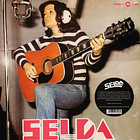The fact that traditional Anatolian folk music and Western psychedelic rock make an almost addictive mixture is proven by current artists and bands such as Derya Yıldırım or Altın Gün. But this fusion has a history that goes back to the second half of the 20th century, and in which Selda Bağcan is one of the protagonists. Where with many examples the context gives you a bit of geek knowledge, with »Selda« it is essential. The album draws on the tradition of the so-called aşıkler, a term for female storytellers and folk musicians. Especially present in Turkey in the 1970s, they represented a rebel figure of the political left especially for the population of rural areas. At the time of the release of »Selda«, in 1973, the musician from Ankara was already in the sights of the authorities. In a country marked by political unrest and coups, she was politically persecuted like many of her comrades-in-arms. Between 1972 and 1992, she was arrested several times, denied access to radio and television and had her passport confiscated. On »Selda«, Bağcan combines love songs and political laments in the aşık tradition. She sings for the underprivileged people – sings of their desires and sufferings, especially poverty – and against classism. With melancholy in her clashing clear voice, Selda Bağcan dedicates herself to the victims of a mining accident in tracks like »Nasırlı Eller«. Song structures suggestive of the West and instrumentation with winds and strings are dominant. »Gine Haber Gelmiş« veers into the opposite direction. Accompanied only by a Bağlama that loops, Bağcan turns to heartbreak. Interestingly, Bağcan’s Anatolian instruments and vocal style in particular give the songs an irresistibly hypnotic and thus psychedelic character. »Selda« is an album that is not only fun to listen to because of the musical mixtures, but also provides insights into a genre rich in tradition as a document of its time.

Selda

